- Home
- Edith Wharton
That Good May Come Page 2
That Good May Come Read online
Page 2
"To think of what?"
"Her white dress, Maurice, her confirmation dress. At the Church of the Precious Blood all the girls are confirmed in white muslin dresses, with tulle veils and moire sashes. Father Thurifer makes a point of it."
"And you promised Annette such a dress?"
"I thought I might, dear, when Mrs. Stapleton decided to give her ball. You see there is a very large class of candidates for confirmation, and I knew it would be very trying for Annette to be the only one not dressed in white--and at such a solemn time, too. But now, of course, she will have to give it up."
"Yes," said Maurice, absently. He stood with his hands in his pockets, his unseeing eyes fixed upon the yellow gleam of the gas- stove, which was now the only point of light in the room.
"And that is what Annette is crying about?" he asked at length.
"Poor child," murmured his mother, deprecatingly; "it is such a solemn moment, Maurice."
"Yes, yes--I know. That's just it. That's why I don't understand--Annette is a very religious girl, isn't she?"
"Father Thurifer tells me that he has never seen a more religious nature. He said that it was as natural to her to believe as to breathe. Isn't that such a beautiful expression?"
"And yet--yet--at such a solemn moment, as you say, it is the color of her dress that is uppermost in her mind?"
"Oh, Maurice, don't you see that it is just because she has so much devotional feeling, poor child, that she suffers at the thought of not appearing worthily at such a time?"
"As if Mrs. Stapleton should ask me to lead the cotillion at her ball when my dress coat is in pawn?"
"Maurice!" said his mother.
"I beg your pardon, mother; I didn't mean that; forgive me. But it all seems so queer--I don't understand."
"I wish you went oftener to church, Maurice," said Mrs. Birkton, sadly.
"I wish I understood Annette better," he returned in a musing tone.
"Annette is a very good girl," said Mrs. Birkton, gathering up her pen and papers. "After the first shock is over she will bear her disappointment bravely; but don't tell her that I have spoken to you about it, for she would never forgive me."
"Poor little thing," Maurice sighed, as his mother groped her way to the door.
He sat still in the darkness after she had left, companioned by the dismal brood of his disappointments, until half an hour later Annette's knock told him that their slender supper was ready.
When he re-entered the kitchen his sister's face had grown as smooth and serene as that of some young seraph of Van Eyck's. She had tied a white apron over her dress and was busy carrying the hot toast and fried eggs from the stove to the table, which had meanwhile been covered with a white cloth and neatly set for the evening meal.
Maurice sat down between her and his mother, listening in silence to their talk, which fell like the trickle of a cool stream upon his aching nerves. They were speaking as usual of church matters, in which the daughter took an eager and precocious, the mother a somewhat ex-official interest; it seemed to Maurice as though Mrs. Birkton, who had resigned herself to getting on without so many things, had even surrendered her direct share in the scheme of redemption, or rather tacitly passed it on to her child. But what more especially struck him was the force of will displayed in Annette's demeanor. Her disappointment, which he felt to be very real, was impenetrably masked behind a mien of gay activity; and Maurice, knowing his own facile tendency to be swayed by the emotion of the moment, marvelled at the child's self-control.
The next morning he went out earlier than usual. As he opened the hall-door he turned back and called to his mother, who was washing the breakfast dishes in the kitchen:
"Mother, if Helfenridge comes you can say that you don't know when I shall be back. Say that I may not be in all day."
"Very well, dear," she replied, with some surprise; but her son's face forbade questioning, and she went on silently with her work.
Maurice, as it happened, returned in time for their one o'clock dinner. His mother thought that he looked pale and spiritless, and feared that he had endured another defeat at the hands of some unenlightened editor.
"Has Helfenridge been here?" he inquired.
"Yes," Mrs. Birkton answered. "He stopped on his way down town just after you had gone out. He was very sorry not to find you, and said that he would come again to-morrow evening."
"Has Annette got back from school?" Maurice asked, irrelevantly.
"I think I hear her step now," Mrs. Birkton replied, and at the same moment the kitchen-door opened, admitting the young girl, whose small face was touched with a frosty pink by the cold.
As she entered Maurice went up to her, extending something in his hand with an awkward gesture.
"Look here--will that buy you a white dress like the rest of the girls?" he said, abruptly.
Annette grew red and then pale; her lips parted, but she made no motion to take the roll of bills which he held out to her.
"Maurice!" his mother gasped. "Have they accepted something? What is it? What is it to appear in?"
Her small features, flattened into life-long submission to failure, seemed almost convulsed by the unwonted expression of a less negative emotion.
Maurice made no answer; he was still looking at Annette.
"Why don't you take it, Annette?" he said, a tinge of impatience in his voice.
"Annette! Annette! why do you stand there? Can't you speak? Why don't you thank your brother?" Mrs. Birkton cried, in a storm of exultation.
Annette held out her hand, but as she took the bills her face again grew crimson.
"Maurice, how did you know about the dress? Mother, you promised not to tell him!" Then, glancing at the roll of money, "But what have you given me, Maurice? A hundred dollars--a hundred and fifty dollars? Mother, what does he mean?"
"Maurice!" Mrs. Birkton almost shrieked.
"Well," said Maurice with a laugh, "isn't it enough to buy your dress?"
Annette stood, trembling, between sobs and laughter; but her mother's tears overflowed.
"Oh, my boy, my son, I'm so happy! I knew it would come. I knew it must--Mr. Helfenridge said so only this morning. But I didn't dream it would be so soon!" She lifted her poor, joy- distorted face to his averted kiss. "Oh, it's too beautiful, Maurice, it's too beautiful! But you haven't told us yet which poem it is."
Maurice turned sharply away, his hand on the door.
"Not yet--not now. I've forgotten something. I'm going out," he stammered.
"Why, Maurice! Without your dinner? You're not well, my son!"
"Nonsense, mother. I shall be back presently. Annette, keep some dinner for me."
"But, Maurice," the girl cried, springing forward, "you mustn't leave all this money with me."
"I've told you it's yours," he said, with a violence which made the women's startled eyes meet.
"Why, Maurice, you must be joking! A hundred and fifty dollars? I oughtn't to keep a penny of it, with all the things that you and mother need."
"Nonsense, keep it all. If it's too much for your dress, mother can take the rest for herself. I don't want it. But mind you spend it all on yourselves; don't use any of it for the household. And remember I won't touch a penny of it."
"But, Maurice," said Mrs. Birkton, "the dress won't cost twenty dollars."
"So much the worse," he retorted; and the door shut on him with a crash that was conclusive.
Helfenridge, whose work (he was a clerk in the same establishment which had been the scene of Maurice's brief commercial experience) often delayed him down town long after his dinner-hour, did not reach his friend's house until eight o'clock on the following evening. As he started on his long ascent of the steep tenement-stairs some one ran against him on the first landing, and he drew back in surprise, recognizing Maurice in the flare of the gas-jet against the whitewashed wall.
"Hullo, Maurice! Didn't Mrs. Birkton tell you that I was coming this evening?"
"I--yes--th
e fact is, I was just going out," Birkton said, confusedly.
Helfenridge glanced at him, marking his evasive eye.
"Oh, very well. If you're going out I'll try again."
"No--no. You'd better come up after all. I'd rather see you now. I've got something to say to you."
"Are you sure?" said Helfenridge. "I'd rather not be taken on sufferance."
"I want to see you," Birkton repeated, with sudden force; and the two men climbed the stairs together in silence.
"Come this way," said Maurice, leading Helfenridge into his bedroom.
He put a match to the gas-burner, and another to the stove, and pushed his only easy-chair forward within the radius of the dry, yellow heat, while Helfenridge threw aside his hat and overcoat, which were fringed with frozen snow.
"You don't look well, Maurice," he said, taking the seat proffered by his friend.
"It's because I'm new at it, I suppose," the other returned, dryly.
"New at what? What do you mean?"
"Wait a minute," said Maurice; "I want to show you something first."
He opened the door as he spoke, and Helfenridge heard him walk along the narrow passage-way to the kitchen; then came the opening of another door, which launched a confusion of soft, gay tones upon the intervening obscurity. "Oh, no, no," Helfenridge heard a young voice half laughingly protest; then an older tone interposed, gently urgent, mingled with an odd unfamiliar laugh from Maurice; lastly the door of the bedroom was suddenly thrown wide, and Maurice reappeared, pushing before him his sister, clad from head to foot in white muslin, her flat, childish waist defined by a wide white sash, even her little feet shod in immaculate ivory kid.
Above all this whiteness her flushed face emerged like a pink crocus from a snow-drift; her lips were parted in tremulous, inarticulate apologies, but no explanatory word reached Helfenridge.
"Why, Miss Annette, how lovely!" he exclaimed at random, questioning Maurice with his eyes.
"There--doesn't she look nice?" the brother asked, retaining his grasp of her white shoulders. "That's her confirmation dress, if you please! She's going to be confirmed next Sunday at the Church of the Precious Blood, and you've got to be there to see it."
"Oh, Maurice," murmured Annette.
"Of course I shall be there," said Helfenridge, warmly. "But what a beautiful dress! Are all confirmation dresses as beautiful as that?"
"Oh, no, Mr. Helfenridge; but Maurice--"
"Father Thurifer likes all the girls in the class to be dressed like that," Maurice quickly interposed. "And now run off before your finery gets tumbled," he added, pushing her out of the room with a smile which softened the abruptness of the gesture.
He shut the door and the two men stood looking at each other.
"She's lovely," said Helfenridge, gently.
"Poor little girl," said Maurice. "Isn't it a pretty fancy to dress them all in white?"
"Yes--I suppose it's a High Church idea?"
"I suppose so. I never knew anything about it until the other day--until two days ago, in fact. Then I found that Father Thurifer had requested all the girls who are to be confirmed to dress in white muslin; and we hadn't a penny between us to buy her a dress with."
"Yes?" said Helfenridge, tentatively.
"Annette's a very good little girl, you know--immensely religious. Father Thurifer says he never saw a more religious nature. And it nearly killed her not to have a white dress--not to appear worthy of the day. She regards it as the most solemn day of her life. Can you understand how she must have felt? I couldn't at first, but I think I do now. After all, she's only a child."
"I understand," said Helfenridge.
"Well, neither my mother nor I had a copper left. There was no way of getting the dress--and it seemed to me she had to have it."
"Yes?"
"I said the other day that I didn't know what would happen if one of us fell ill; but in a way it would have been simpler than this. Annette, now--if Annette had been ill we could have sent her to the hospital. My mother is too sensible to have any prejudice against hospitals. But this is different--there was no other way of getting the dress; and it had to be got somehow. I don't believe her wedding-dress will seem half so important to her-- there's so little perspective at fifteen."
"Well?" said Helfenridge after a pause.
"Well, so I--good God, Helfenridge, won't you understand?"
Both men were silent; Helfenridge sat with his hands clenched on the arms of his chair.
Suddenly he said, as if in a flash of remembrance: "You sent that thing to Baker Buley--the thing about Mrs. Tolquitt?"
"Yes," said Maurice.
A long pause followed, in which the thoughts of the two men cried aloud to each other.
At length Maurice exclaimed, "I wish you'd speak out--say what you think."
"I don't know," said Helfenridge, in a low tone.
"You don't know? You mean you don't know what to say?"
"What to think."
"What to think of a man who's sold his soul?"
"I'm not sure if you have. It seems to me that I'm not sure of anything," Helfenridge said.
"I am--I'm sure that Annette had to have her dress," said Maurice, with a defiant laugh.
"When does it come out?"
"It's out already--it came out this morning. It's all over town by this time."
"Do they know?" asked Helfenridge, suddenly.
"My mother and Annette? God forbid. Do you suppose they would have touched the money?"
"How did you account to them for having it?"
"I told them that was my secret--that they shouldn't know for the present. Of course the--the thing in the Kite is not signed; and later, if one of my poems ever finds its way into print, they'll think it's that--but they'll have to wait."
Helfenridge rose. "I must be going," he said.
"Why do you go? Because you're afraid to tell me what you think? You may say what you please--it can't make any difference. Annette had to have the dress. I've been trying to avoid you for two days because I was afraid to tell you, but now I'd rather talk about it--that is if you care to have anything more to do with me. Because, after all, I'm no better than a blackguard now, you know-- there's no getting around that fact. You've a perfect right to cut me."
Helfenridge was mechanically pulling on his overcoat.
"At what time does the confirmation take place?" he asked. "Tell Miss Annette that I shall certainly be there."
On the ensuing Sunday morning, punctually at half-past ten o'clock, a closed carriage from the nearest livery-stable drew up before the house occupied by the Birktons. It was snowing hard, and Annette's spotless draperies and flowing veil were concealed under an old cloak of her mother's as, sheltered by Maurice's umbrella, she stepped across the sidewalk, clasping her prayer-book in one tremulous, white-gloved hand. Mrs. Birkton followed, her shabby bonnet refurbished with fresh velvet strings, and a glow of excitement on her small effaced features. She and her son placed themselves on the front seat, leaving Annette to expand her crisp robe over the width of the opposite cushions; and the carriage rolled off heavily through the deepening snow.
All three sat silent during their slow, noiseless drive. Maurice was looking out of the window, so that the women saw only his uncommunicative profile. Mrs. Birkton sat wiping away the tears from her flushed face. They were pleasant tears, and she let them roll gently down her cheeks before she dried them. As for Annette, her face was pale, with the candid pallor of an intense but scarce-comprehended emotion. She sat bolt upright, in a kind of pre-Raphaelite rigidity which accorded with the primitive inexpressiveness of her rapt young features and the shadowless chalk-like mass of her dress and veil.
At length the carriage paused behind a train of others; and after some moments of delay, which seemed to lend a preparatory solemnity to their approach, Maurice, in the wake of his mother and sister, passed from the snowy crudeness of the outer world into the rich and complex atmosphere of the
Church of the Precious Blood.
The raw, sunless daylight, mellowed by the jewelled opacity of stained-glass windows, fell with a caressing brilliance across the aisles, streaking the clustered shafts with heraldic emblazonments of gules and azure and leaving the intervening spaces swathed in a velvety dusk. On the altar, with its embroidered hanging, the candle-flames hovered like yellow moths over the white lilies rigidly disposed in tall silver vases; while in their midst, relieved against the sculptured intricacies of the reredos of grayish stone, rose the outstretched arms of the great golden crucifix.
The church was already crowded; but a ribbon, latitudinally dividing the central aisle, indicated that the foremost rows of chairs (there were no pews in the Church of the Precious Blood) had been reserved for the candidates for confirmation and their relations. Thither Maurice followed his mother and Annette, passing through a dove-like subsidence of feathery white and a double row of innocent young faces to the seats assigned to them by the verger. Glancing about as he moved up the aisle he had caught a glimpse of Helfenridge seated far back, with his head against a pillar; and the sight lent him some momentary comfort.
Maurice cast down his eyes while Mrs. Birkton and Annette knelt to pray; and when he looked up the long white procession of choristers, preceded by the crucifer, was winding toward the chancel, while the first notes of the hymn
How bright these glorious spirits shine!
Whence all their white array? leapt jubilantly out of the expectant hush.
Maurice, observing his sister, saw the gravity of her vague young profile intensified to awe as the procession swept past their seats, closed by the sumptuous grouping of the ample-sleeved bishop with his attendant clergy in their embroidered vestments, and seen through the mauve mist of drifting incense fumes. To him it was like fingering the leaves of a missal in some Umbrian sacristy, speculating idly, as he looked, upon the meaning of the delicate miniatures, wherein serene-visaged personages, saintly or seraphic, enacted their mysterious drama in a setting of fanciful white architecture or against a blue background starred with gold. But to Annette, he perceived, it was something real, as real as physical birth or death. Through the symbolic phantasmagoria, which she perhaps understood still less than he, ran a thread of actuality, linking her timid being to the occult significance of the whole splendid scene; and Maurice saw her tremble with the sense of that august alliance. Perhaps, after all, he reflected, it was the white dress which formed the actual point of contact. At least he was glad to think that it made her a part of the pageant, a conscious factor in the gorgeous sacrifice of praise and prayer.

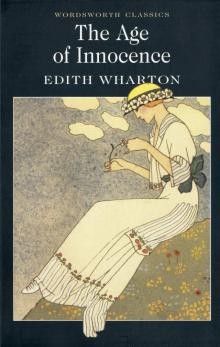 The Age of Innocence
The Age of Innocence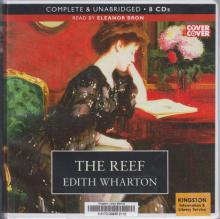 The Reef
The Reef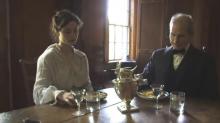 Summer
Summer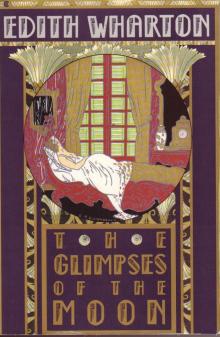 The Glimpses of the Moon
The Glimpses of the Moon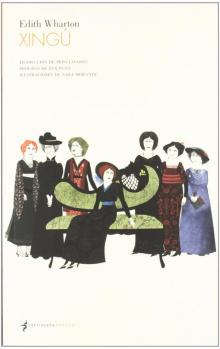 Xingu
Xingu The Fruit of the Tree
The Fruit of the Tree Fast and Loose
Fast and Loose Artemis to Actaeon and Other Verse
Artemis to Actaeon and Other Verse The Line of Least Resistance
The Line of Least Resistance The Lamp of Psyche
The Lamp of Psyche The Reckoning
The Reckoning Afterward
Afterward The New York Stories of Edith Wharton
The New York Stories of Edith Wharton The 2014 Halloween Horrors Megapack
The 2014 Halloween Horrors Megapack 'Copy': A Dialogue
'Copy': A Dialogue The Recovery
The Recovery The Fulness of Life
The Fulness of Life Early Short Stories Vol. 1
Early Short Stories Vol. 1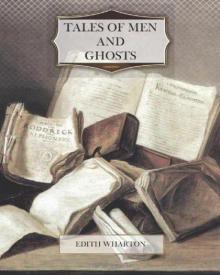 Tales of Men and Ghosts
Tales of Men and Ghosts The House of the Dead Hand
The House of the Dead Hand That Good May Come
That Good May Come The Buccaneers
The Buccaneers Other Times, Other Manners
Other Times, Other Manners The Hermit and the Wild Woman
The Hermit and the Wild Woman Kerfol
Kerfol The Duchess at Prayer
The Duchess at Prayer Bunner Sisters
Bunner Sisters The Choice
The Choice Madame De Treymes
Madame De Treymes Ethan Frome, Summer, Bunner Sisters
Ethan Frome, Summer, Bunner Sisters In Morocco
In Morocco The Valley of Decision
The Valley of Decision Age of Innocence (Barnes & Noble Classics Series)
Age of Innocence (Barnes & Noble Classics Series) The Angel at the Grave
The Angel at the Grave April Showers
April Showers Sanctuary
Sanctuary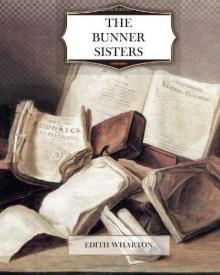 The Bunner Sisters
The Bunner Sisters Mrs. Manstey's View
Mrs. Manstey's View Writing a War Story
Writing a War Story The Custom of the Country
The Custom of the Country In Trust
In Trust The Triumph of the Night
The Triumph of the Night The Hermit and the Wild Woman, and Other Stories
The Hermit and the Wild Woman, and Other Stories Roman Fever and Other Stories
Roman Fever and Other Stories The Mission of Jane
The Mission of Jane The Descent of Man and Other Stories
The Descent of Man and Other Stories Coming Home
Coming Home The Touchstone
The Touchstone Early Short Stories Vol. 2
Early Short Stories Vol. 2 Edith Wharton's Verse, 1879-1919, from various journals.
Edith Wharton's Verse, 1879-1919, from various journals.